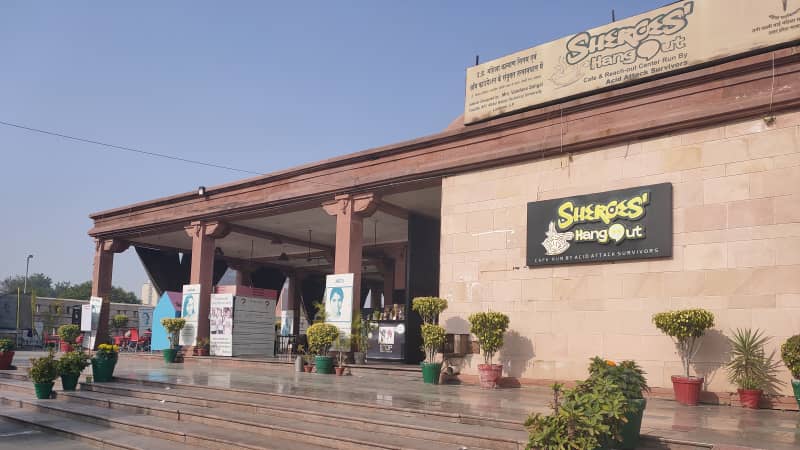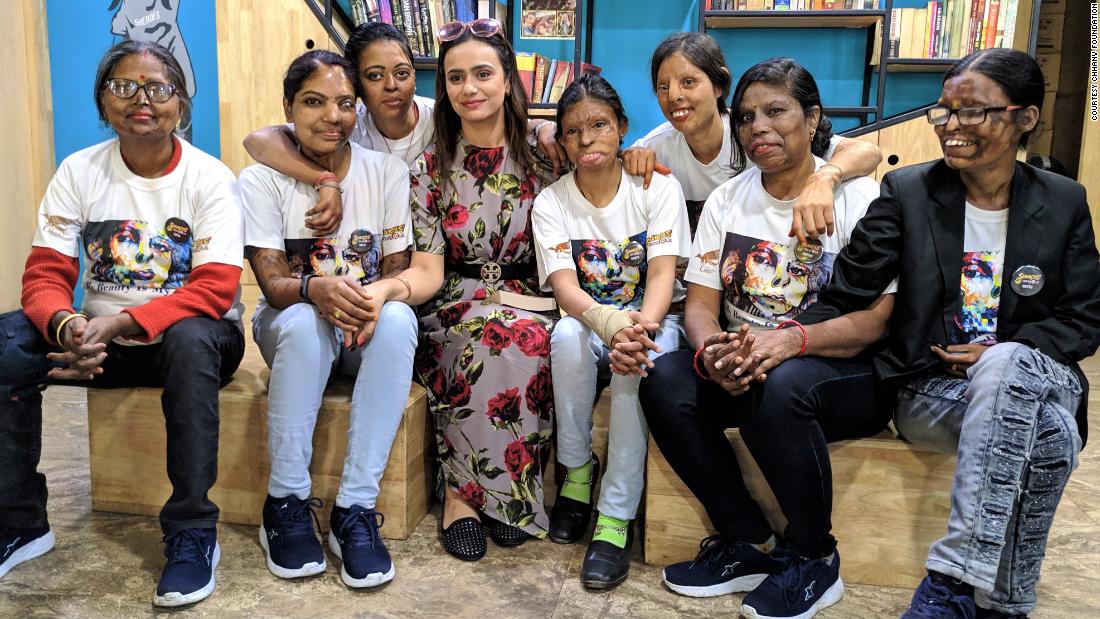(CNN) — Up until recently, many travelers visiting India’s famed monument of love, the Taj Mahal, would also add a stop at the nearby Sheroes Hangout to their itinerary.
Located just a few kilometers from the famed Indian icon in the northern city of Agra, this cafe is managed and staffed by acid attack survivors.
The cafe — which also has a library, radio station and informational displays — has provided them with more than just employment. It has given them the confidence to face society without shame, while learning valuable career skills.
But the Covid-19 pandemic and its subsequent lockdown have taken their toll on the Sheroes Hangout Café. Since the start of the pandemic, revenues have dropped by 80%, forcing the café to close indefinitely in April.
“Our visitors were mainly tourists,” Ashish Shukla, director of the Chhanv foundation and Sheroes Hangout co-founder, tells CNN Travel.
“But, with travel impacted, our sales went down drastically. Therefore, we didn’t have any other option but to stop the operation.”
Every day for the past seven weeks they have been putting together around 100 food packets for daily distribution.
Early in the morning, a team from the foundation and employees of Sheroes gathers at the café and delegates work among themselves. Some go to the market to buy vegetables while some cook. Others go to some of the city’s worst-hit areas to distribute the food packets.
Every person has a specific role to play in the “assembly line.”
Learning new skills
The women of Sheroes have also utilized the lockdown period to diversify their skills, exploring different avenues that will allow them to follow their passions.
Shukla says a few of the younger women signed up for beautician courses, as they want to open their own salons. Some of the women are interested in fashion, so they’ve been learning to design and stitch garments with the hopes of opening a boutique. Others are focusing on making jewelry.

Women employed by Agra’s Sheroes Hangout are using their downtime to learn new skills.
Courtesy Chhanv Foundation
Rupa, 26, from the city of Muzaffarnagar in Uttar Pradesh, has undergone seven surgeries since the age of 13, when her stepmother splashed acid on her. The restaurant, she says, has given women like her recognition and power to fight the world.
When the lockdown was imposed earlier this year, Rupa took the time to learn basic computer skills, English and sewing.
“I always loved new and stylish clothes and hoped to become a fashion designer. Now I stitch my own clothes,” she says.
Fellow Sheroes employee Anshu Rajput always had a deep interest in writing. She has used the downtime to improve her writing skills and now prepares scripts for Instagram reels and short videos.
“My café job gave me confidence and the opportunity to try new things. If it had not been for Sheroes, I would have hidden my face throughout my life,” she says.
Meanwhile Madhu Kashyap, a mother of two, wants to start a school, where her daughter can teach poor students. She also wants to open a garment shop in the future.
Low conviction rates
According to India’s National Crime Records Bureau (NCRB), there were nearly 1,600 victims of acid attacks from 2014-2018 — a least one a day.
Though men are sometimes targeted, most victims are women. The perpetrators don’t usually intend to kill but to disfigure their victims’ faces.
Revenge is the most common motive, according to statistics, while family disputes are also often involved. These men, women and, at times, children, face lifelong isolation as they cover their faces and shun society.
Laws are in place to deter this heinous crime, while over the counter sales and purchases of acid are regulated; as per Section 326 A of the Indian Penal Code, a perpetrator can face a minimum of 10 years’ imprisonment, which can extend to life imprisonment, with fines.
However, the conviction rate is very low.
Ray of hope
The Sheroes Hangout Café has changed the lives of many female victims, not only providing financial stability but by also allowing the badly scarred victims to face the world with dignity.
Here, the employees don’t need to cover their disfigured faces. They wear makeup and chat confidently with customers, comfortable sharing the most horrifying moments of their lives with them.

Agra’s Sheroes Hangout has a small library, pictured.
Courtesy Chhanv Foundation
Founder Shukla says they got the idea for the café in 2013, when a group of friends initiated a Stop Acid Attacks campaign aimed at creating awareness and calling for more stringent laws to punish the perpetrators.
One day a mother and daughter duo met the foundation members. The woman, who was attacked — along with her daughter — by her husband for not giving birth to a male child, asked if the foundation could provide them with work as they were unable to meet their daily expenses.
Anshu Rajput, Sheroes Hangout employee
“They were in a very pitiable condition,” recalls Shukla. “We thought of starting a grocery shop for them but we were a little skeptical whether they would be able to run it or not. Then, the idea of a restaurant struck my mind, as it can employ not one but many.”
Initially the café faced financial problems but within a year it became popular among both locals and foreigners.
People from all walks of life, including former Italian prime minister Paolo Gentiloni Silveri and German First Lady Elke Büdenbender, visited the Agra restaurant and promised to help sustain it.
A few years later, a second Sheroes café opened in the city of Lucknow, employing around 30 acid attack victims.
‘Everyone called me ugly’
“I heard about Sheroes from one of my friends,” says Madhu Kashyap, who joined the Agra café in 2016.
“I covered my face, and went to the restaurant. Surprisingly, I found none of them had covered their faces but were chatting confidently with the patrons, happily posing for selfies with them.”
Kashyap, 45, recounts the horrific day in 1997 when she was attacked by a man after refusing his marriage proposal.
Her fiancée stood by her and they got married. But she struggled to get a job anywhere due to her scarred face.
“The café pumped new hope into my life,” smiles Kashyap.
Anshu Rajput, a resident of Bijnor in Uttar Pradesh, has a similar story. She was just 15 years old when she refused the advances of her 55-year-old neighbor. In response, the man hurled acid at the teenager.

Lucknow’s Sheroes Cafe has recently reopened.
Courtesy Chhanv Foundation
“Everyone called me ugly,” shares Rajput. “So, I veiled my face to avoid any hurtful comments. The only time I stepped out of my home was when I had to go to the hospital. I never thought of having a normal life again. Thanks to the café, I am living like anyone else.”
Fortunately, the Lucknow location has been able to reopen following the easing of lockdown restrictions. They have no rent obligations as the property was given to them by the government.
But it will be some time before the Agra location is able to welcome patrons again, even though the Taj Mahal reopened to tourists in June. Based in rented premises, Sheroes has high operational costs and many of their customers are foreigners, says co-founder Shukla.
With India’s borders still shut to international tourists due to the pandemic, it could be quite some time before the café is able reopen — maybe as long as a year, Shukla speculates.
For now, the foundation’s priority is to secure the livelihoods of Sheroes’ employees — and that includes equipping them with the necessary skills to pursue their dreams.
Top image: With the Sheroes Hangout cafe closed due a lack of visitors, employees have been using donations to put together daily food packages for Agra’s needy.
